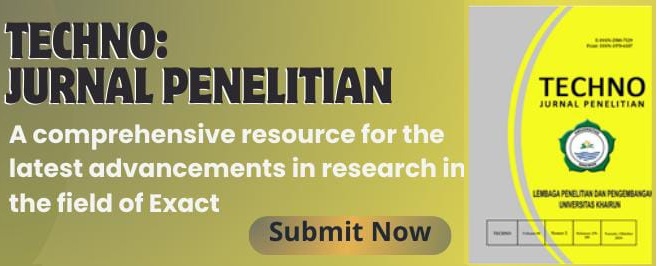- Focus and Scope
- Section Policies
- Peer Review Process
- Publication Frequency
- Open Access Policy
- Article Processing Charge (APC)
Focus and Scope
FOCUS AND SCOPE
TECHNO: Jurnal Penelitian is a journal published by the Research and Community Service, Universitas Khairun. Published twice a year (May and October), contains six to fiveteen articles and receive articles or literature review in the field of Exact Science review studies with research methodologies that meet the standards set for publication. Manuscript articles can come from researchers, academics, practitioners, and other scientist observers who are interested in research in the field of Exact.
- Chemistry and Chemical Engineering
- Physics, Material, and Mechanical Engineering
- Biology, Ecology, Conservation, Plant and Animal, Genetics, and Biomolecular
- Food and Agriculture Engineering
- Computer Science and Engineering
- Earth Science and Engineering
- Electrical Engineering
- Architecture and Civil Engineering
- Environment Science and Engineering
- Mechanical Engineering
- Basic Science in Engineering Education
- New Technologies in Education
- Computers, Internet, Multimedia in Engineering Education
Section Policies
Artikel
Peer Review Process
PEER-REVIEWED PROCESS
All papers are fully peer-reviewed. We only publish articles that have been reviewed and approved by highly qualified researchers with expertise in a field appropriate for the article. We used double-blind peer-reviewing process.
In short, the steps are:
- Manuscript Submission (by author)
- Manuscript Check and Selection (by manager and editors). Editors have a right to directly accept, reject, or review. Prior to further processing steps, plagiarism check using turnitin or iThenticate is applied for each manuscript.
- Manuscript Reviewing Process (by reviewers)
- Notification of Manuscript Acceptance, Revision, or Rejection (by editor to author based on reviewers comments)
- Paper Revision (by author)
- Revision Submission based on Reviewer Suggestion (by author) with similar flow to point number 1.
- If reviewer seems to be satisfied with revision, notification for acceptance (by editor).
- Galley proof and publishing process.
The journal editor or editorial board considers the feedback provided by the peer reviewers and arrives at a decision. The following are the most common decisions:
- accept without any changes (acceptance): the journal will publish the paper in its original form
- accept with minor revisions (acceptance): the journal will publish the paper and asks the author to make small corrections
- accept after major revisions (conditional acceptance ): the journal will publish the paper provided the authors make the changes suggested by the reviewers and/or editors
- revise and resubmit (conditional rejection): the journal is willing to reconsider the paper in another round of decision making after the authors make major changes
- reject the paper (outright rejection): the journal will not publish the paper or reconsider it even if the authors make major revisions
Publication Frequency
This journal is published 2 times per year, May and October.
Open Access Policy
Techno Jurnal Penelitian is provides open access in principle to make research freely available to the public and will support the largest global knowledge exchange.
Benefits of open access for the author, include:
- Free access for all users worldwide
- Authors retain copyright to their work
- Increased visibility and readership

Techno Jurnal Penelitian is licensed under a Creative Commons Attribution-NonCommercial 4.0 International License.
Article Processing Charge (APC)
There are no article submission, article processing charges or any other charges, and no charge for any reader to download articles for their own scholarly use.


























